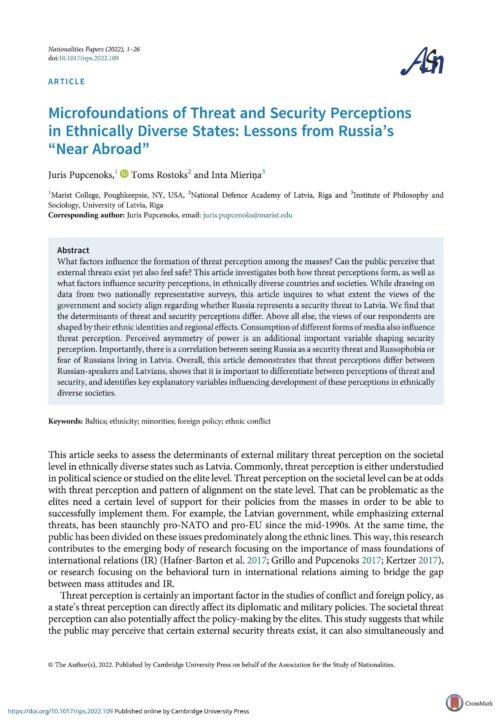Juris Pupčenoks

Responding to Russian Strategic Narratives and Disinformation in East Europe
This project will investigate to what extent diplomatic rhetoric influences states’ behavior and evaluate how certain Eastern European states respond to narratives of a regional hegemon. More specifically, it will first look at how Russian strategic narratives (or strategic rhetoric that countries use to frame their positions and interests in attempts to influence both publics at home and audiences abroad) towards Ukraine, Latvia and Moldova have evolved from the mid-2000s to the present. Next, it will investigate how these smaller countries have engaged with Russian narratives and disinformation in them. Smaller countries have limited kinetic capabilities to resist or threaten regional powers, but they can coordinate their own strategic narratives and counter-messaging. There is potential for such information warfare operations to be an equalizing force. A better understanding of how Russia uses diplomatic language to target smaller countries and spread disinformation will also help with coming up with strategies on how to counter such propaganda more effectively. Additionally, by looking at how other countries have responded to Russian rhetoric will lead to better understanding of what strategies can be successful (or not) in countering authoritarian country information operations. This project will be guided by the following research questions:
What are the Russian SNs towards Ukraine, Latvia and Moldova?
What role does disinformation play in such narratives?
Are changes in Russian narratives linked to important kinetic or socio-political developments?
How have these three smaller countries responded to Russian narratives towards them? What lessons can the rest of us draw from such responses?
Biography
Juris Pupcenoks is an Associate Professor of Political Science and a Co-Chair of the Annual Undergraduate Research Conference at Marist College, NY, USA. He is also a Programs Co-Chair for the Ethnicity, Nationalism and Migration Studies Section of the International Studies Association. Previously, he was a Fellow at Bard College, Visiting Scholar at University of Latvia, Member of the Carnegie Council for Ethics in International Affairs New Leaders Initiative and Researcher at the Lorenzo de' Medici Institute in Florence, Italy. He is the author of more than 20 academic publications including monograph Western Muslims and Conflicts Abroad (Routledge 2016), and articles in International Interactions, Nationalities Papers, The International Journal of Press/Politics, Nationalism and Ethnic Politics and Middle East Journal, among others. His research and publications deal with Russian diplomatic communication and strategic narratives, military intervention, threat perception and securitization, diasporas and ethnic politics, and Russian-speakers in the post-Soviet space.
Publications

Microfoundations of Threat and Security Perceptions in Ethnically Diverse States: Lessons from Russia’s “Near Abroad”
Cambridge University Press on behalf of the Association for the Study of Nationalities
